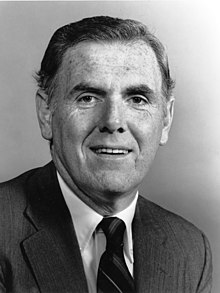Raymond Flynn | |
|---|---|
 Flynn (circa 1984–1987) | |
| 4th United States Ambassador to the Holy See | |
| In office September 2, 1993 – September 20, 1997 | |
| President | Bill Clinton |
| Preceded by | Thomas Patrick Melady |
| Succeeded by | Lindy Boggs |
| Mayor of Boston | |
| In office January 2, 1984 – July 12, 1993 | |
| Preceded by | Kevin White |
| Succeeded by | Thomas Menino |
| 49th President of the United States Conference of Mayors | |
| In office 1991–1992 | |
| Preceded by | Robert M. Isaac |
| Succeeded by | William Althaus |
| Boston City Councilor | |
| In office January 1978 – January 2, 1984 | |
| Preceded by | Louise Day Hicks and John J. Kerrigan |
| Succeeded by | N/A (number of at-large seats reduced) |
| Member of the Massachusetts House of Representatives | |
| In office January 1975 – January 1978 | |
| Preceded by | Royal L. Bolling and Dorris Bunte |
| Succeeded by | Dorris Bunte |
| Constituency | 7th Suffolk |
| In office January 1971 – January 1975 Serving with Michael F. Flaherty Sr. | |
| Succeeded by | Elaine Noble |
| Constituency | 6th Suffolk |
| Personal details | |
| Born | Raymond Leo Flynn July 22, 1939 Boston, Massachusetts, U.S. |
| Political party | Democratic |
| Spouse | Catherine Coyne |
| Children | 6 (including Ed) |
| Parent(s) | Stephen Flynn Lillian Kirby Flynn |
| Alma mater | Providence College (BA) Harvard University (MA) |
Raymond Leo Flynn (born July 22, 1939) is an American politician who served as the mayor of Boston, Massachusetts, from 1984 until 1993. He also served as United States Ambassador to the Holy See from 1993 to 1997.
Flynn was an All-American college basketball player at Providence College. During his senior year, Flynn was selected the "Most Valuable Player" in the 1963 National Invitation Tournament. After a brief professional basketball career, Flynn worked in several fields, including as a high school teacher and a probation officer, before entering politics. As a politician, Flynn was regarded to be a economic liberal and a cultural conservative. Flynn began his political career as a Democratic member of the Massachusetts House of Representatives from 1971 to 1979, representing the South Boston neighborhood during the turbulent Boston desegregation busing crisis of the early 1970s. Flynn opposed federally-mandated school busing. Throughout his political career, Flynn held a strong anti-abortion position. Flynn was As a state legislator, Flynn co-authored the "Flynn–Doyle amendment" to ban government funding of abortions covered by Medicaid. This was initially successfully vetoed by Governor Michael Dukakis. However a version of the amendment was passed over Dukakis's veto in 1978. Flynn served on the Boston City Council from 1978 to 1984. As a city councilor, Flynn stood in opposition to rate increases by utility companies and regularly proposed tenants' rights ordinances.
Flynn was elected mayor of Boston in 1983 and took office in 1984. Flynn was reelected in 1987 and 1991. Polls showed Flynn to enjoy strong approval from Bostonians during his mayoralty. As mayor, Flynn balanced the city's budget, eliminating a large budget deficit. To address the deficit, Flynn lobbied heavily for the passage of a revenue package for the city in the Massachusetts Legislature to provide additional state aid to the city and the authorization for the city to raise new local taxes. In 1985, a revenue package was passed and signed into law by Governor Dukakis. In response to discriminatory practices studies found banks to be practicing in Boston, Flynn took actions which persuaded banks to reach a $400 million community reinvestment agreement with the city. Flynn succeeded in getting legislation passed to replace the city's publicly-elected school board with the new Boston School Committee, members of which are appointed by the city's mayor. Flynn would quickly come to express his regret about this change. F In 1990, Flynn saw strong criticism from Black leaders over the Boston Police Department's handling of the investigation into the murder of Carol Stuart. As mayor, Flynn advanced plans to desegregate the city's public housing, and made efforts to heal the city's racial divides. Flynn's mayoral administration granted neighborhood groups more of a voice in the use of the city's development and planning authorities in their neighborhoods. This included innovative move of granting the Dudley Street Neighborhood Initiative powers of eminent domain. Flynn successfully fought to enact rent control laws and strong tenants' rights laws. Flynn also served as president of the United States Conference of Mayors from 1991 to 1992.
Flynn resigned as mayor in 1993 in order to accept an appointment by President Bill Clinton as ambassador to the Holy See. He expanded the position's mission to involve participation in addressing problem areas around the world. During his tenure as ambassador, he also encountered some controversy. In 1998, Flynn unsuccessfully ran for the United States House of Representatives. Flynn later served as president of Catholic Alliance, a nonpartisan Catholic advocacy group.